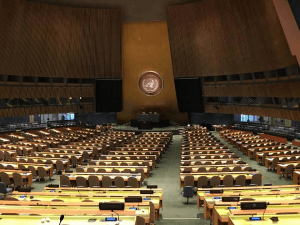Mediation and Peacebuilding, A Natural Trajectory. Member Spotlight: Mina Vaish
Mina Vaish has been a fulltime mediator practitioner for almost 15 years and started her own mediation practice in 2006. Her company, York Mediation, where she is the Managing Director, is based in Richmond Hill, Canada, and includes a team of five mediators who mediate family, civil, workplace and commercial cases. She is also an onsite mediator at three Superior Courts of Justice and Ontario Court of Justices in the Greater Toronto Area.
Canadian Blocks of Peace
 She readily stated that “I honestly think that mediation and peacebuilding are in my blood. It feels natural to me, I think it is because where I come from and my ancestry.” She expressed that being from the peaceful nation of Canada, there is a historical influence founded on the principles of Lester B. Pearson which has set the path for the country and which was conducive to her path as a mediator. “Fundamentally, we are supported in Canada by positive peacebuilding blocks. Human rights protection, gender equality, social structure, and the rule of law.”
She readily stated that “I honestly think that mediation and peacebuilding are in my blood. It feels natural to me, I think it is because where I come from and my ancestry.” She expressed that being from the peaceful nation of Canada, there is a historical influence founded on the principles of Lester B. Pearson which has set the path for the country and which was conducive to her path as a mediator. “Fundamentally, we are supported in Canada by positive peacebuilding blocks. Human rights protection, gender equality, social structure, and the rule of law.”
Mina came with her parents from India – a country that struggles with deep-rooted religious and social conflict but also has democratic roots and values – to Canada when she was 10 months old. Culturally, her family always had an eye towards Mahatma Gandhi’s principles of nonviolence and to this day resonates strongly with her. She began mediation training in 2004 and started practicing under the supervision of a practicing mediator. Shortly after, she started to investigate different avenues to develop her mediation capability. Mina is completing her Masters of Law (LL.M)at Osgoode Hall Law School, York University where she specialized in dispute resolution. She also serves as an occasional Osgoode Hall Law Faculty Member in the Professional Development Program.
Peacebuilding at the International Level
Forthwith, Mina is focusing 50% of her time on international endeavors, shifting from her core business of local and national mediation to the international realm. Peacebuilding is a natural trajectory for her, and she believes that there is a lot of potential around collaborative processes. “The true value of mediation, national dialogue, and collaborative and processes hasn’t yet been realized on a global scale.” There is more to be done when looking at positive peace indicators and the linkages to the Sustainable Development Goals (SDGs), such as the eradication of poverty, rule of law, gender equality, and human rights, etc.
She urges the incorporation of peace indicators that revolve around a national strategic directive on how much time and investment countries devote to mediation, collaborative process, and dialogue in order to rank them at an international level. “Evolution of our global society must move towards understanding where we want to be in 100 years and even 1000 years from now.” To achieve this, Mina is currently developing the MBBI Canada chapter and hoping it will develop into more skills and competencies for Canadian mediators to be deployed in the future. Her current goal is to continue finding ways of working in peacebuilding at the international level to create a more peaceful world.
Gender Equality at the CSW
 From her mentor, the late Vicki Isler, Mina became involved in the MBBI UN Working Group and soon moved into the Women in Mediation Action Group, which she now serves as Chair. The group works on the integration of women in peace processes and one of its main focuses is MBBI’s delegation to UN Women’s Commission on the Status of Women (CSW). The Working Group has attended every CSW over the last six years of which she has led the delegation for the last four years. The 2019 delegation was the largest, with thirty MBBI members in attendance.
From her mentor, the late Vicki Isler, Mina became involved in the MBBI UN Working Group and soon moved into the Women in Mediation Action Group, which she now serves as Chair. The group works on the integration of women in peace processes and one of its main focuses is MBBI’s delegation to UN Women’s Commission on the Status of Women (CSW). The Working Group has attended every CSW over the last six years of which she has led the delegation for the last four years. The 2019 delegation was the largest, with thirty MBBI members in attendance.
On March 16, 2019, the Working Group offered the first interactive workshop on women, mediation, and the effective implementation of the UN Agenda on Women, Peace, and Security. The written statement submitted is now an official document that was posted and accepted by UN Women. She proudly declared that all genders are on the working group and that part of the purpose is that they don’t exclude anyone “It is about equal opportunity. It was founded on the fact that history often excludes and/or mutes womens’ voices during peace processes.”
The raison d’être for the group is in reference to the SDG 5 – Gender Equality. She calls gender equality a driving force bringing women to the negotiation table, especially in countries where they are marginalized and/or ostracized from peace processes. Mina continued to explain that her work and that of the group are all based on UN Security Council Resolution 1325, which is the resolution to bring more women to negotiation and peacebuilding circles. The group’s premise is around talking about self-determination especially when discussing issues that are women-centric.
When talking about “Reproductive rights, social income, childcare, maternity, women’s issues… when they are not at the negotiation table it seems absurd, there is no stakeholder investment. Sustainable peace and peacebuilding must involve the people who are actually experiencing it. We often view things through our own experience or conceptual lens, that is why it is so important in decision making and negotiation processes to include every voice.”
Article by Kylea Shropshire, MBBI Writer
